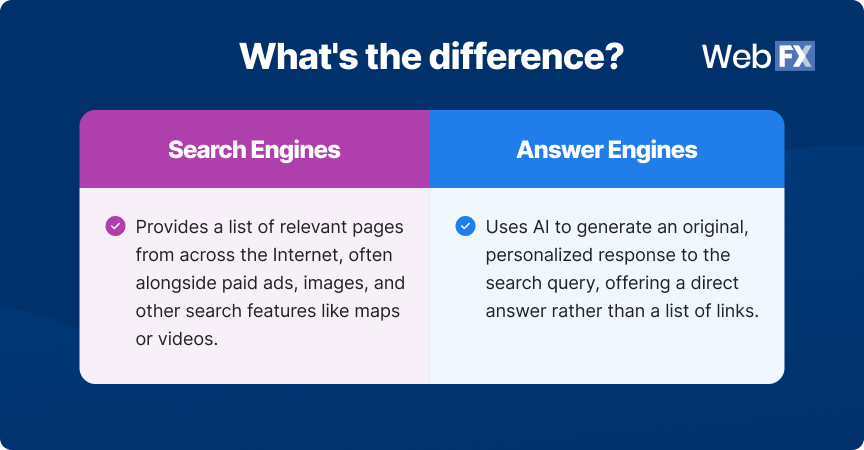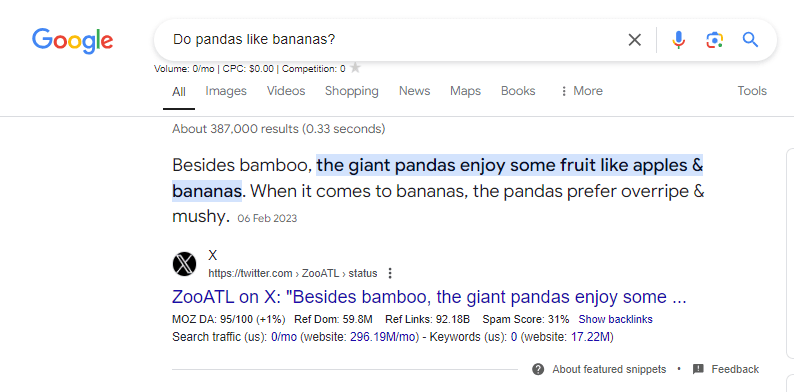-
 Published: Oct 3, 2024
Published: Oct 3, 2024
-
 7 min. read
7 min. read
-
Summarize in ChatGPT
-
 Celeste Yates
Celeste Yates Content Writer
Content Writer
- Celeste has worked in the online marketing space for twenty years. She has written for sectors including tourism, sustainability, education, lifestyle, food, and marketing. You can find her work featured by Green Building Media South Africa, Stodels Gardening, and The Post House Hotel. In magazines, you may have seen her in The Cape Times, Oprah South Africa, and The Property Magazine. While you can find her writing up on the latest SEO trends and exploring digital techniques during the day, her love of story-telling carries on in enriched games and books after hours.
- How is an answer engine different from a search engine? Unlike a search engine that shows a relevant website, an answer engine offers an immediate, accurate response created through AI-driven natural language understanding
- What is an answer engine? An answer engine is designed to provide direct answers to user queries without requiring clicks to websites, pulling data directly from sites to deliver single responses through platforms like Siri, Alexa, and Google’s Featured Snippets.
- Is SEO being replaced by answer engine optimization (AEO)? AEO is not replacing SEO but rather enhancing it — businesses must optimize for both to stay competitive, as AEO focuses on structured data and schema markup while SEO continues driving website traffic through traditional methods.
- What are best practices for answer engine optimization? Focus on question-based keywords, create conversational content with long-tail keywords that resemble natural speech patterns, develop FAQ sections, and use structured formats like bullet points and short paragraphs to increase chances of appearing in featured snippets.
- Why should businesses care about answer engines? As consumers increasingly seek instant, voice-activated solutions and quick answers without exploring multiple pages, optimizing for answer engines helps businesses capture traffic and conversions at multiple touchpoints while maintaining visibility in evolving search landscapes.
Search engines have long been the primary way to find information online, with Google leading the way for businesses looking to drive traffic and revenue. However, the rise of answer engines is changing the landscape. Unlike search engines that list relevant web pages, answer engines provide direct, concise answers using AI and natural language processing.
For businesses with an online presence, understanding the difference between an answer engine vs search engine—and knowing when to leverage each—can significantly impact growth and user engagement.
- What is an answer engine?
- How does an answer engine differ from a search engine?
- Is search engine optimization evolving to answer engine optimization?
- Best practices for an answer engine strategy
What is an answer engine?
An answer engine is designed to provide direct answers to user queries without requiring the user to click through to the website. Answer engines such as Siri, Alexa, and even Google’s Snippets pull data directly from a website and give it to users in a single response, bypassing traditional page clicks.
But, an answer engine doesn’t only pull from the web. You can have an answer engine that pulls from data sets or computational knowledge, such as WolframAlpha. It also doesn’t have to be text-based. Answer engines, like Alexa and Siri, are voice search engine versions.
Natural Language Processing & AI-powered
Answer engines are typically powered by artificial intelligence (AI) and natural language processing (NLP) to better understand the context of the user’s search. The rise of different answer engines shows a shift in how users interact with information online. Users are leaning towards getting responses quicker and in a more complete manner.

How does an answer engine differ from a search engine?
Looking at the differences between answer engine vs. search engine, you’ll see that search engines retrieve a list of relevant web pages based on a user’s query. They rank the various results based on factors such as keyword relevance, domain authority, and user experience.
This approach encourages users to explore different options and provides opportunities for the user to conduct their own research. With answer engines, the response is already formulated in a concise, quick, and contextually accurate manner.

As you can see above, the snippet gives me the answer I need immediately, without me having to read through a whole page or blog about pandas.

Key statistics
- In the U.S., 40% of all Internet searches are conducted through voice search.
- 58% of consumers use voice search to find information about local businesses.
- Each month, approximately 1 billion voice searches are made.
- By December 2023, ChatGPT had around 180 million users.
- On average, a ChatGPT user spends 7 minutes and 46 seconds on the platform per visit. This is 28% shorter than the typical Google visit duration of 10 minutes and 49 seconds, and 60% less than the average YouTube visit, which lasts 19 minutes and 35 seconds.
- A recent survey by Tidio, which polled nearly 1,000 Internet users, found that 63% believe businesses should be allowed to advertise on ChatGPT similar to Google Search.
- Additionally, 50% of respondents think ChatGPT will eventually surpass Google as the leading search engine.
Is search engine optimization evolving to answer engine optimization?
The ultimate answer engine vs. search engine question! The answer? Not entirely.
Search engine optimization (SEO) has been the cornerstone of marketing for decades. But as consumers become more comfortable with instant, voice-activated solutions, answer engine optimization (AEO) will become more prevalent. While it won’t replace SEO, it will impact SEO and the results that appear in search engines.
The challenge is that fewer users may actually visit your website if their questions are answered on the search results page. Opportunities, though, lie in optimizing for both answer engines and traditional search engines to capture traffic, conversion, and revenue at multiple touchpoints.
AEO is driven by changes in user behavior. People are turning to get fast, specific answers — they don’t want to waste time exploring. That means you need to change the way your content is presented to keep up with this growing trend.
Does AEO differ from SEO?
Yes, it does. Marketing teams will have to include an answer engine strategy within their overall marketing strategy. While SEO focuses on strategies like keyword optimization and backlinks, AEO requires more focus on structured data and schema markup to help the engines understand the information and pull it up directly into their answers.
Answer engines are also becoming more conversational and demanding precise answers, shifting towards content written in natural language and more question-based queries.
Is SEO becoming AEO?
No, they are two separate identities. AEO is more of an enhancement to your SEO strategy. The demand for both will continue to grow, especially in common search queries, like sourcing a product or service locally, or finding out a quick answer to a common question.
While SEO will remain a key strategy for driving website traffic, AEO will grow in its sophistication, meaning businesses will have to adapt to both to stay competitive.
Best practices for an answer engine strategy
Let’s look at some top tips when creating your answer engine strategy!
1. Focus on question-based keywords
Featured snippets are the most common way for search engines to deliver direct answers in response to user queries. They are also similar to how voice search assistants pull information. Create content that directly answers common questions in your industry. Remember to structure the content concisely, with bullet points and short paragraphs, if you want to do answer engine optimization of your website.
2. Create conversational content
Voice search queries tend to be more conversational, therefore your content should reflect that. When answer engine optimization your site, use long-tail keywords that resemble natural speech patterns and create a FAQ section to directly answer common questions in a conversational tone.

In the example above, you can see that I’ve asked a conversational question to both a search engine and an AI answer engine. As you can see, the search engine is finding my question about spiders and tap dance confusing, giving me other options in the “did you mean” section, as it knows the results are not going to help me. The answer engine, however, captures my question and gives me an explanation. It also, almost human-like, gives me a logical answer while gently saying my question is impossible. After all, a tap-dancing spider is preposterous.
3. Stay up to date with the latest
AI technology is rapidly evolving and in full swing within the marketing industry. Ensure you review your strategy to include the different types of queries that drive traffic to your site, and adapt your content to meet it. Analyze traffic data to see what questions your content is answering and where you can improve. On the flip side, also check to see how emerging technologies are displaying content, to alter your content accordingly.
Answer engine or search engine? We can optimize for both
With the proper answer engine strategy, your business can appear directly in answer engine responses, helping drive traffic to your site and increasing conversions. However, AEO, much like SEO, can be complex.
With WebFX, you can improve your Google rankings and help more of your content get featured in AI-driven answers. Our team stays up-to-date with the latest marketing trends and applies them to your marketing, so your strategy stays agile.
We are here to drive your business growth through optimized AEO and SEO techniques. Call us at 888-601-5359 or contact us online to speak with a strategist about increasing your revenue.
-
 Celeste has worked in the online marketing space for twenty years. She has written for sectors including tourism, sustainability, education, lifestyle, food, and marketing. You can find her work featured by Green Building Media South Africa, Stodels Gardening, and The Post House Hotel. In magazines, you may have seen her in The Cape Times, Oprah South Africa, and The Property Magazine. While you can find her writing up on the latest SEO trends and exploring digital techniques during the day, her love of story-telling carries on in enriched games and books after hours.
Celeste has worked in the online marketing space for twenty years. She has written for sectors including tourism, sustainability, education, lifestyle, food, and marketing. You can find her work featured by Green Building Media South Africa, Stodels Gardening, and The Post House Hotel. In magazines, you may have seen her in The Cape Times, Oprah South Africa, and The Property Magazine. While you can find her writing up on the latest SEO trends and exploring digital techniques during the day, her love of story-telling carries on in enriched games and books after hours. -

WebFX is a full-service marketing agency with 1,100+ client reviews and a 4.9-star rating on Clutch! Find out how our expert team and revenue-accelerating tech can drive results for you! Learn more
Try our free Marketing Calculator
Craft a tailored online marketing strategy! Utilize our free Internet marketing calculator for a custom plan based on your location, reach, timeframe, and budget.
Plan Your Marketing Budget

See AI Marketing in Action
Explore how WebFX helped a regional brand get discovered in AI search experiences — proving what’s possible with today’s AI-driven marketing!

Proven Marketing Strategies
Try our free Marketing Calculator
Craft a tailored online marketing strategy! Utilize our free Internet marketing calculator for a custom plan based on your location, reach, timeframe, and budget.
Plan Your Marketing Budget
What to read next




